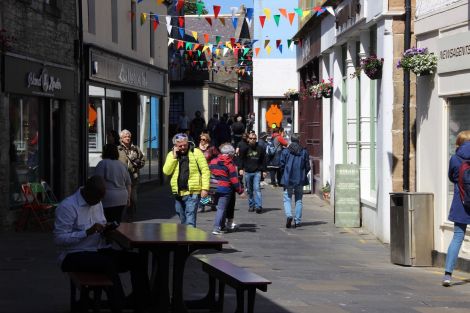Business / Knitwear van plans fall foul of licensing policy
COUNCILLORS have called for a review of policy on street trading licences in Shetland after a knitwear company was refused a permit to sell goods out of a van in the centre of Lerwick.
The application from Fair Isle knitwear company BAKKA fell foul of policy formed in the 1990s which prohibits street traders from selling goods of the “same or similar class and description” as shops within 50 metres.
Mary Macgregor, who runs the company, said she was “very disappointed” with the ruling made by Shetland Islands Council’s licensing committee on Monday and confirmed she would appeal.
Her application to trade from her preferred location of Irvine Place next to the pet shop during peak tourist periods received objections from Living Lerwick as well as some town based retailers which sell knitwear.
They pointed to Irvine Place being within 50 metres of other shops selling knitwear such as Anderson and Co and Ninian.
Macgregor – who currently trades from a stall at Harrison Square – also requested to sell goods from the van at Charlotte Place as part of her application.
She told councillors, however, that she did not want to trade from Charlotte Place if she had a choice as it meant opening the van’s door onto a loading area, while it would probably also result in less custom.
Macgregor said in her application that her work is unique as “no-one else is producing Fair Isle knitwear in fine gauge”, and as a result she does not feel it is “the same or similar class and description” as any other retailer operating nearby.
The knitwear designer, who would have driven the van back and forth to Lerwick when it was not trading, said in her submission to the council that she was trying to “bring more life to the street”.
Become a member of Shetland News
She said she would direct customers to other knitwear shops if they were after something she did not offer.
Macgregor read out to councillors letters of support she had received for her application, including from a former college textile technician and a tour guide.
She explained that when she started BAKKA she sought to offer a different product to what was already available locally.
“I decided to go into fine gauge range and not use Shetland wool,” Macgregor said.
She added that putting up and taking down the stall at Harrison Square was affecting her health, with a van offering a simpler set-up.
The issue of the “similar goods” policy was a much-discussed topic during the councillors’ debate, with Macgregor showing members examples of her work.
Members said they were appreciative of the pieces and their distinctiveness, but North mainland councillor Alastair Cooper said he felt unsure on the definition of “similar goods” when it came to knitted pieces.
He said it was his view that the products should be classed as general knitwear, meaning that they would contravene the 50 metre policy.
Environmental health’s Patti Dinsdale said she believed the council’s policy conditions on street trading were drawn up in the 1990s and had not been revised since.
Lerwick North councillor Malcolm Bell called for the condition to be reviewed, saying that the town centre was a different prospect from what it was in the 1990s.
He said on that basis he would move to refuse the application and seek an early review of the the conditions.
Bell received support from Cooper, who said that while the condition was “ambiguous” the application should be turned down.
Westside member Catherine Hughson, however, proposed that the application be granted for one year and the conditions reviewed afterwards.
Town councillor Cecil Smith supported Bell’s motion, saying that Commercial Street shops pay overheads and go through periods of low sales in the winter – something which a mobile van could avoid.
South mainland councillor George Smith, meanwhile, said it was “fine margins between what’s competition and what’s complementary”, but he felt the van would benefit the town centre as a whole and backed Hughson’s proposal.
He also questioned how there is often an ice cream van trading near shops on Commercial Street selling similar goods, but Dinsdale was not in a position to provide clarification.
The decision went down to a vote, with Bell’s motion also gaining the support of chairman Ian Scott to pass with four votes against two against Hughson’s proposal.
Scott said it was with “great reluctance” he had overseen the application’s refusal and suggested that Macgregor could apply again next year against reviewed conditions.
Speaking after the meeting, Macgregor described the council policy as “no longer fit for purpose”.
She questioned what the difference was between her current street traders licence issued in 2017 for the Harrison Square stall, located just metres away from Irvine Place, and the new application.
A planning application, meanwhile, was previously submitted by Macgregor to site the van at Irvine Place for more than the 28 days a year allowed by a street trader licence.
That application has received objections, some relating to traffic and pedestrian safety, while it has also received letters of support.
Become a member of Shetland News
Shetland News is asking its readers to consider paying for membership to get additional perks:
- Removal of third-party ads;
- Bookmark posts to read later;
- Exclusive curated weekly newsletter;
- Hide membership messages;
- Comments open for discussion.
If you appreciate what we do and feel strongly about impartial local journalism, then please become a member of Shetland News by either making a single payment, or setting up a monthly, quarterly or yearly subscription.







































































